Key takeaways:
- Reparations serve as a form of restorative justice, acknowledging historical and ongoing harms, and addressing economic disparities rooted in systemic racism.
- The historical context of race issues highlights the enduring impacts of slavery, Jim Crow laws, and the civil rights movement, emphasizing the need for continued advocacy for racial equity.
- Personal experiences with race shape individual understanding and perspective, revealing the importance of empathy and recognition of diverse narratives in discussions about race and reparations.
- The future of reparations discussions relies on community engagement, education, and ongoing dialogue to bridge divides and foster understanding among different perspectives.

Understanding reparations politics
Reparations politics is a complex landscape shaped by historical injustices and ongoing disparities. I remember a conversation I had with a friend who was skeptical about reparations; it made me realize how deeply personal experiences can influence one’s understanding of systemic injustice. How can we truly grasp the weight of reparations without reflecting on the stories of those who have suffered?
I often reflect on how reparations are not just about monetary compensation; they symbolize an acknowledgment of pain and a commitment to repair. After learning about the racial wealth gap and its deep roots, I found myself questioning whether we can ever truly heal without addressing these economic disparities. Isn’t it crucial to look beyond surface-level discussions and engage with the emotional and historical narratives that drive the reparations conversation?
Moreover, the debates surrounding reparations can elicit strong emotions, revealing the divide in perspectives on race and justice. I’ve seen families torn apart by differing opinions on these issues, reminding me that reparations politics isn’t just a topic for academic discourse—it’s a deeply personal matter that resonates in our daily lives. How can we navigate these conversations with empathy and understanding while ensuring that we honor the experiences of those affected by systemic injustices?
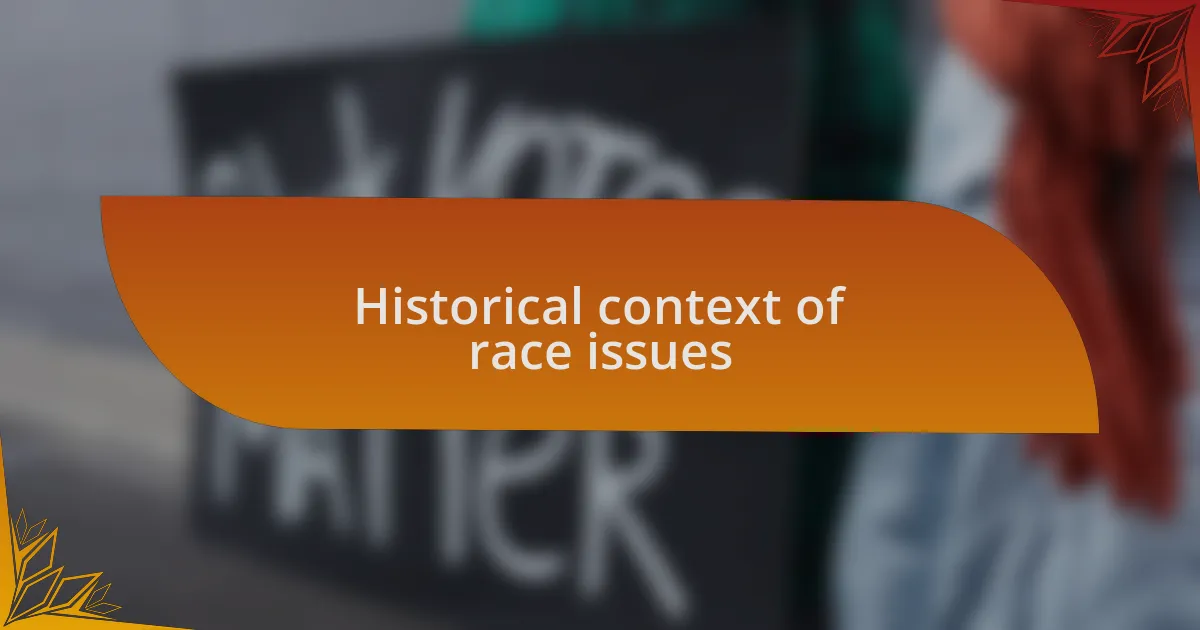
Historical context of race issues
The historical context of race issues is marked by systemic oppression and the struggle for equity. Reflecting on my own education, I remember learning about the transatlantic slave trade and its long-standing impacts on Black communities—not just in the past, but how those legacies continue to shape today’s racial dynamics. How can we ignore the profound trauma that reverberates across generations, affecting identity and opportunity?
The abolition of slavery did not usher in true freedom; instead, it laid the groundwork for further discrimination through Jim Crow laws and redlining. I recall a heated discussion I had at a community meeting where someone questioned why reparations are necessary when slavery was abolished so long ago. This reaction highlighted for me how often the historical narratives we absorb fail to connect with the present realities faced by marginalized communities. What does it take for people to see that the roots of current inequalities run deep into our nation’s history?
Furthermore, the civil rights movement was a pivotal moment, yet even after victories in legislation, the fight for racial equity remains unfinished. I’ve often felt a sense of urgency when discussing these issues, especially when I witness the re-emergence of systemic racism in various forms today. Aren’t we obligated to uphold the victories gained by those who fought before us by continuing to address the inequalities that persist?
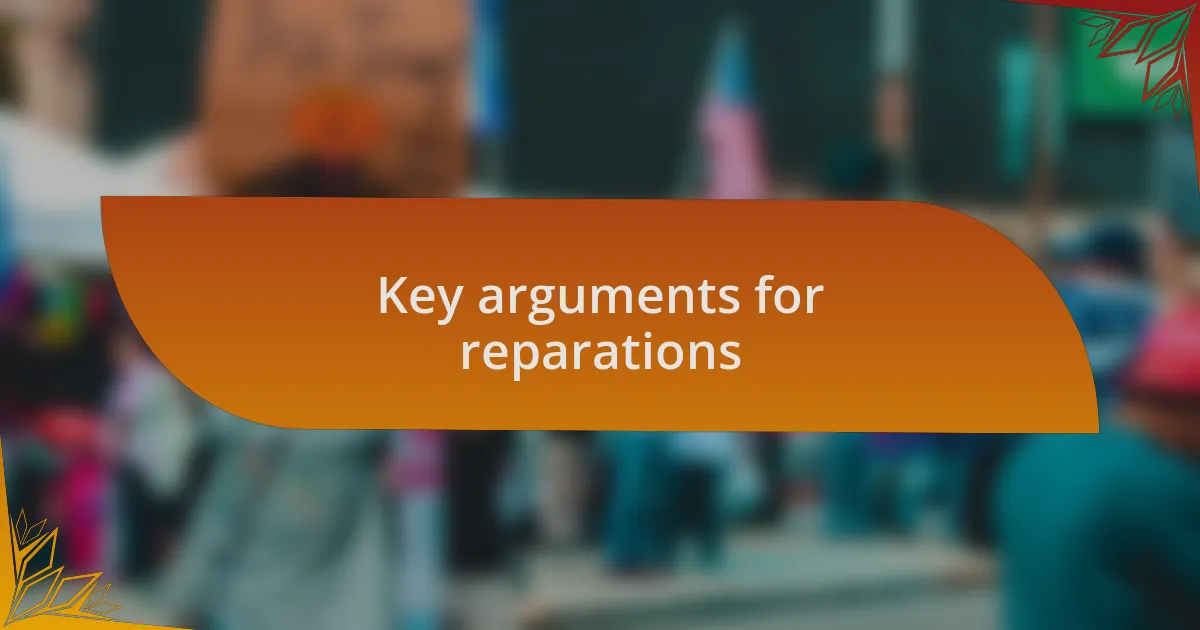
Key arguments for reparations
One key argument for reparations is that they serve as a form of restorative justice, acknowledging and addressing the historical and ongoing harms caused by slavery and systemic racism. I once attended a seminar where the speaker passionately articulated how reparations could help heal the wounds of the past and present—transforming the narrative from guilt and denial to one of acknowledgment and responsibility. Don’t we owe it to ourselves to confront the truth of our history together?
Another compelling point is that reparations can help close the wealth gap that persists due to centuries of disenfranchisement. I’ve seen firsthand in my community how access to education and home ownership has been systematically denied to Black families, leading to devastating economic disparities. If we truly want to build a more equitable society, isn’t investing in reparations a vital step toward correcting these injustices?
Moreover, reparations could promote social solidarity and understanding among different racial groups. I remember a moment during a mixed-race discussion group when a participant shared how learning about reparations transformed their perception of privilege and accountability. Wouldn’t fostering such conversations help bridge divides and build a more inclusive society?
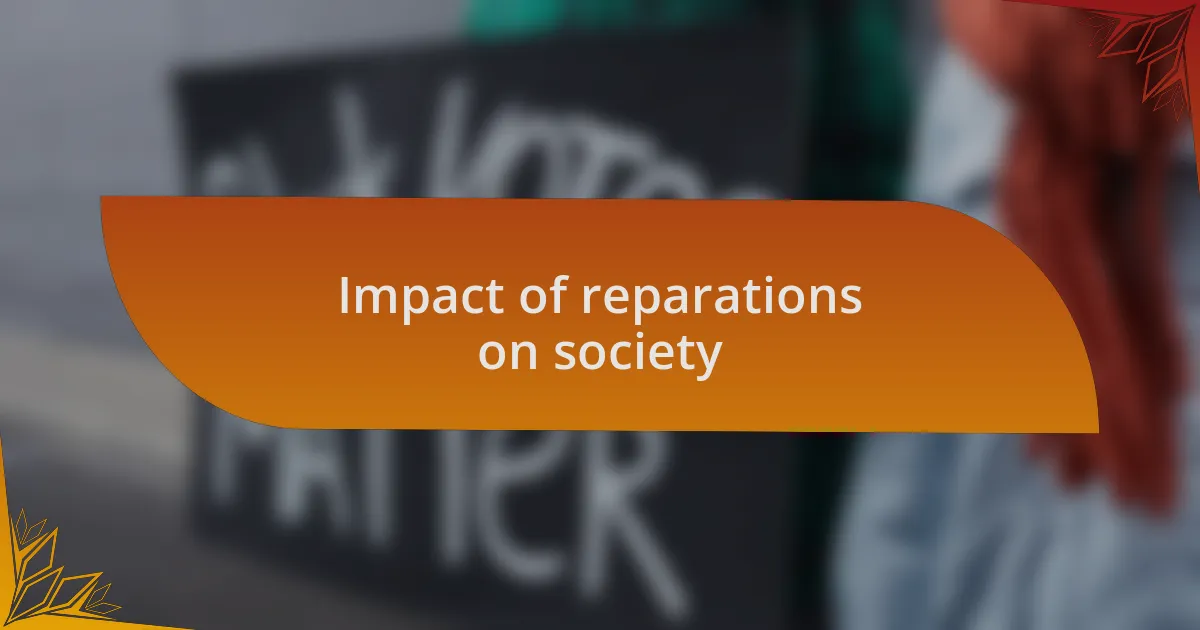
Impact of reparations on society
The potential impact of reparations on society is profound, as it can redefine relationships among communities. I remember chatting with a friend whose family had benefited from historical privileges, and they were unsettled yet intrigued by the concept of reparations. Conversations like those highlight how acknowledging past injustices can lead to genuine dialogues that foster understanding and empathy—don’t we all seek a society where everyone feels heard?
Implementing reparations could also catalyze significant changes in public policy and economic structures. I once volunteered for a community organization that focused on economic empowerment, and I witnessed how targeted investment could uplift marginalized areas. Imagine if reparations spurred similar initiatives on a national level; it could nurture thriving local economies, benefiting everyone in the long run.
Moreover, reparations could encourage a cultural shift towards accountability and collective responsibility. During a recent discussion on race, a participant expressed how grappling with the realities of reparations made them reflect on their own role in societal structures. Isn’t it powerful to think that embracing reparations might inspire individuals to look inward and lead to broader societal transformation?
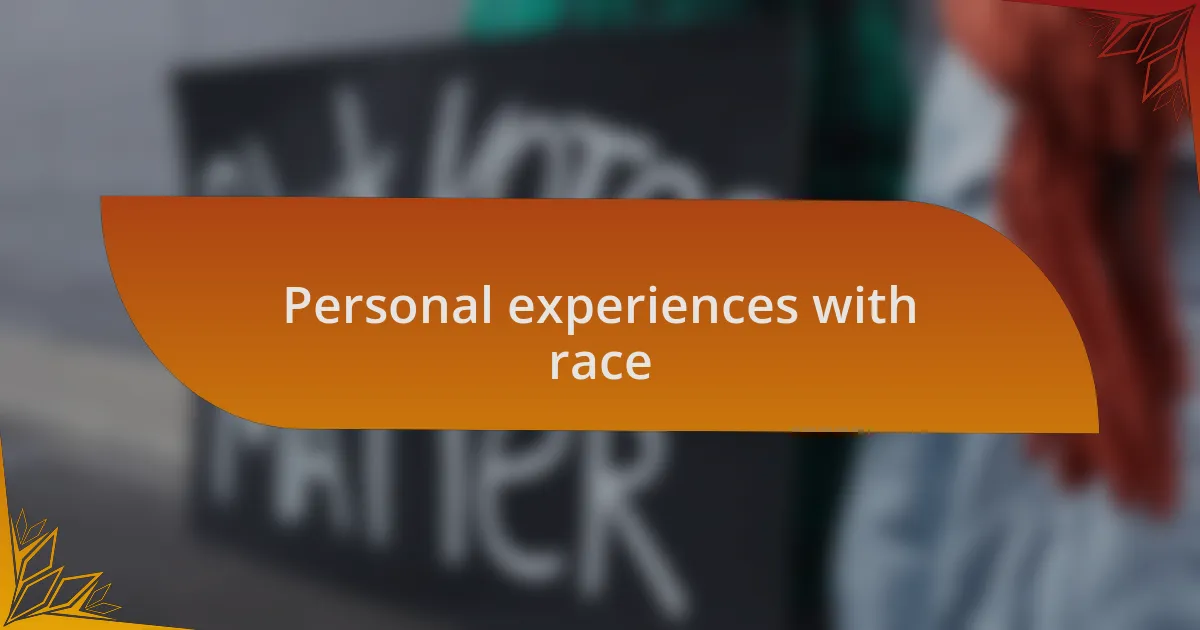
Personal experiences with race
Personal experiences with race shape our understanding of the world in complex ways. I recall a moment from my childhood when I was the only person of color in my classroom. The isolation I felt became more apparent during a project on cultural heritage; while my peers shared rich histories, I grappled with a sense of invisibility. How do we find our place in a narrative that often overlooks us?
As I grew older, I became acutely aware of the subtle and overt ways race influenced interactions around me. I once stood in line at a grocery store and overheard a conversation between two customers dismissing a local community initiative aimed at supporting minority-owned businesses. Their dismissive comments stung, and I couldn’t help but wonder—what must it feel like to be disconnected from the struggles of those around us, especially when their battles are shaped by the very systems that seem to protect our own?
Additionally, working alongside a diverse team opened my eyes to the varied experiences we all carried. I remember a colleague sharing her story of navigating job interviews, where she often felt the need to downplay her identity to fit in. Her experience resonated with me deeply, prompting me to question—how many of us mold ourselves to meet societal expectations just to be accepted? In these moments, I recognized that personal experiences with race aren’t isolated stories; they weave together into a broader tapestry that reflects both the pain of division and the possibility of unity.
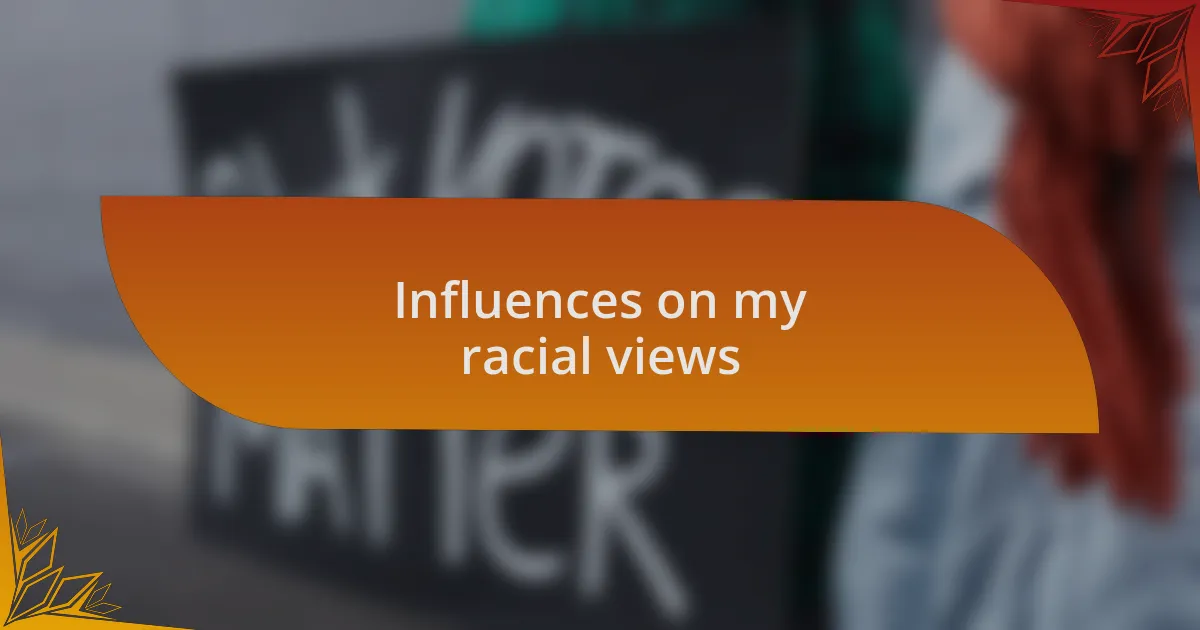
Influences on my racial views
Reflecting on the influences that have shaped my racial views, I cannot overlook the impact of my family’s discussions around identity. I remember sitting around the dinner table, where my parents would share their experiences of navigating racism in their own lives. These conversations instilled in me the understanding that race is not just an abstract concept; it’s a lived reality that can affect opportunities and relationships. How does one reconcile the stories of their upbringing with the world they see?
During my college years, I took part in a workshop on racial equity. It was an eye-opening experience, as I heard powerful testimonies that highlighted the systemic nature of racism. One story that struck a chord was from a classmate who spoke about the advantages her lighter skin afforded her. This led me to ponder—how often do we fail to acknowledge the privilege embedded in our own experiences, and what does that mean for those who face daily injustices?
A defining moment came when I volunteered at a community center helping youth from various backgrounds. I was struck by one young girl’s frustration; she expressed sadness over seeing her peers struggle to see their value in a society that often equates worth with race. In listening to her, I felt an overwhelming sense of responsibility to advocate for change. What if we could create spaces where every voice is valued? This question continues to drive my exploration of race and its pervasive influence on our society.
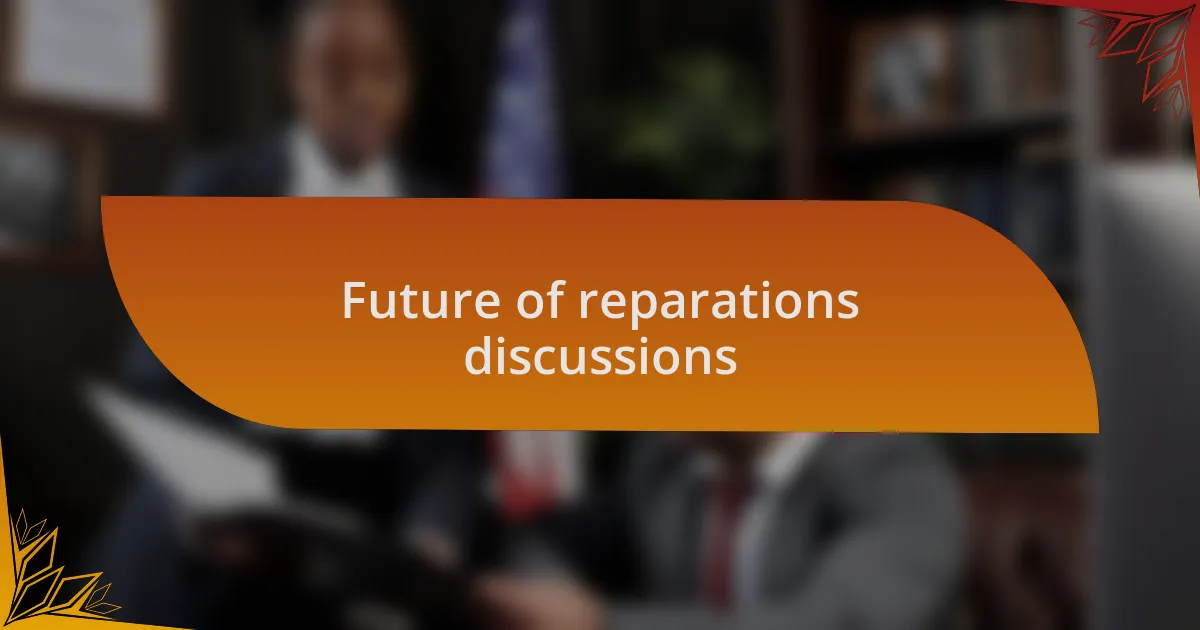
Future of reparations discussions
Looking ahead, I believe the future of reparations discussions will hinge on the willingness to listen and learn from diverse perspectives. I remember chatting with a friend who, despite having a good heart, was initially resistant to the idea of reparations, viewing it as an unnecessary burden on taxpayers. It made me realize that bridging the divide requires patience and a commitment to ongoing dialogue. Can we really expect change if we aren’t willing to explore each other’s viewpoints?
As conversations continue, I foresee a growing emphasis on local and community-based reparations initiatives. I recently attended a town hall meeting where families shared how land redress could transform their neighborhoods. Witnessing that, I couldn’t help but feel hopeful—when communities take ownership of these discussions, it fosters a sense of agency and empowerment. Isn’t that the kind of change we want to support?
Ultimately, the evolution of reparations discourse might pivot on integrating educational frameworks into the broader conversation. I fondly recall a late-night discussion with a cousin about the historical narratives that are often glossed over in schools. There’s so much power in education; it can challenge entrenched beliefs and cultivate empathy. How can we expect understanding if the full context is never taught? It’s vital that future discussions prioritize these educational efforts to create informed advocates for justice.